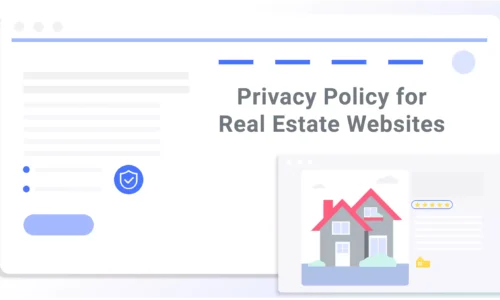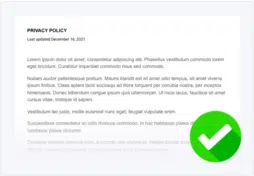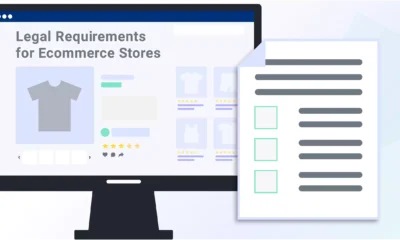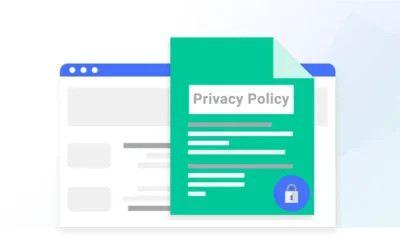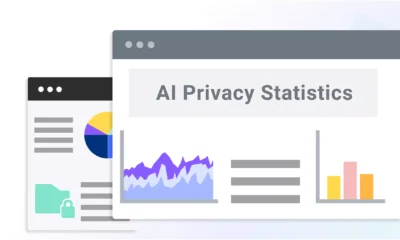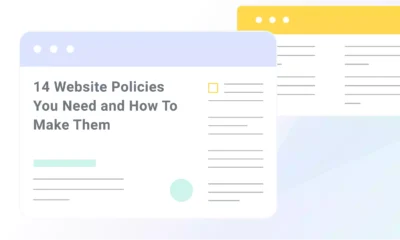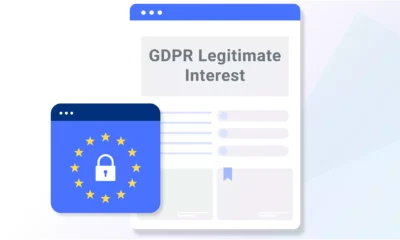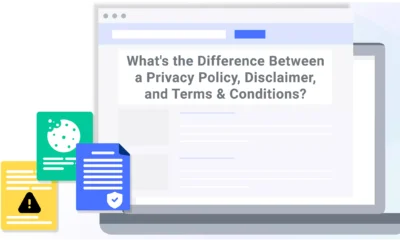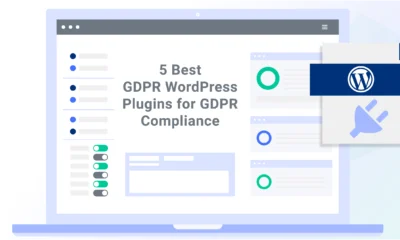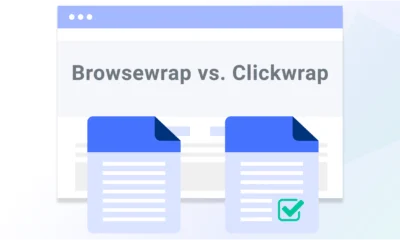For real estate agents and professionals, a website provides a critical connection with customers where you can share property listings, market your services, maintain a list of available properties, and receive inquiries to schedule showings.
Because this work involves collecting and processing users’ personal information, you also need a privacy policy on your real estate website.
A privacy policy for real estate websites helps you meet legal obligations, fosters client trust, and bolsters your business reputation.
Below, learn what a privacy policy is, how privacy laws affect real estate sites, and the benefits of one on your website.
- Creating a Real Estate Site Privacy Policy
- What Is Privacy Policy?
- Which Privacy Laws Affect Real Estate Websites?
- Does Your Real Estate Website Legally Need a Privacy Policy?
- What Are the Benefits of Having a Privacy Policy on Your Real Estate Website?
- What Should You Include in Your Real Estate Website’s Privacy Policy?
- Where To Display Your Real Estate Site’s Privacy Policy
- Summary
Creating a Real Estate Site Privacy Policy
Use one of the following methods to build a quality privacy policy for your real estate website.
Use a Privacy Policy Generator
The simplest way to make a privacy policy for your real estate site is to use Termly’s free Privacy Policy Generator.
Termly’s committed to protecting the privacy of our users.
Our legally-backed comprehensive solution asks easy questions about your business and helps you comply with applicable laws.
It then generates a unique policy based on your answers that you can embed directly on your site, taking all the hassles and guesswork out of data privacy compliance.
See what it looks like in the screenshot below.
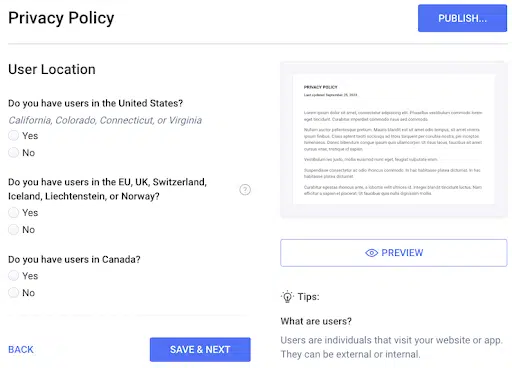
Use a Privacy Policy Template
If you prefer a more hands-on approach, use our privacy policy template.
The best part about using a template? Most of the writing is already done.
Just modify the clauses and blank sections to fit your real estate website requirements and needs and post it to your website or app.
Write It Yourself
You can also use our guide on writing a privacy policy and make your own policy from scratch.
Real estate websites collect different types of information, and laws may vary depending on the services you offer.
So be mindful not to leave any necessary details out — if you do, even by mistake, data privacy laws may hold you financially accountable.
What Is Privacy Policy?
A privacy policy is a legal document that explains to website users how you intend to collect and handle their personal data and includes the following details:
Your real estate agency may collect personal information protected by state, federal, and international privacy laws.
As a result, your privacy policy must meet certain disclosure and protection requirements for the information you collect, such as:
- First and last names
- Mailing address, physical address, email, or telephone number
- Social security number
- Driver’s license
- Geolocation and IP address
- Date of birth
- Bank account and credit card information
- Usernames and passwords
Which Privacy Laws Affect Real Estate Websites?
Privacy laws vary widely depending on the scope of your website, the type of information you collect, and your customers’ locations.
Even if you only handle real estate sales in a particular county, city, state, or country, you may be subject to data privacy laws anywhere your site is accessible.
A real estate website may be subject to international data protection regulations, including:
- European General Data Protection Regulation (GDPR)
- UK General Data Protection Regulation (UK GDPR)
- Canada’s Personal Information Protection and Electronic Documents Act (PIPEDA)
In the U.S., the following state-level privacy laws could affect your online real estate business:
- California Consumer Privacy Act (CCPA)
- California Online Privacy Protection Act (CalOPPA)
- Colorado Privacy Act (CPA)
- Utah Consumer Privacy Act (UCPA)
- Virginia Consumer Data Protection Act (VCDPA)
While no specific federal privacy laws exist in the U.S., industry-specific laws like the Gramm-Leach-Bliley Act (GLBA) could impact parts of the real estate industry.
The Federal Trade Commission (FTC) bases its Standards for Safeguarding Information on the GLBA, commonly known as the Safeguards Rule.
While these rules don’t apply to companies engaging in traditional real estate activities like listing and closing, your agency may be subject if you engage in financial activities, including:
- Real estate settlement services
- Real estate and personal property appraisals
- Mortgage brokering
- Buyer and seller finder services
You can stay up-to-date on U.S. privacy laws with our US state privacy law tracker.
Does Your Real Estate Website Legally Need a Privacy Policy?
Your real estate website likely needs a privacy policy to meet all applicable legal requirements.
Real estate websites attract people who want to move from other states or countries, and they may be protected by data privacy laws that you must respect, like the GDPR.
You could face legal claims, fines, and sanctions if your site violates privacy protections.
A privacy violation could also negatively affect your professional reputation, compromise consumer trust in your brand, and irreparably harm your business.
To avoid legal liability, post a comprehensive privacy policy on your website that adheres to any privacy or industry-specific law that applies to you.
What Are the Benefits of Having a Privacy Policy on Your Real Estate Website?
A clear, well-written privacy policy provides the following benefits and protections for your real estate business and potential customers:
Establishes a Reputation for Integrity
Maintaining a transparent, easily accessible privacy policy lets clients know they can trust you with their personal information.
Provides Legal Protection For Your Business
Posting a privacy policy that addresses client data handling helps protect you from fines and lawsuits that could arise from legal non-compliance under laws like the GDPR, CalOPPA, or the CCPA.
Ensures Client Data Security
From the customer’s perspective, a clear privacy policy sets their mind at ease because they know your company actively works to protect their private information from bad actors.
Streamlines Partnership With Third Parties
In the interest of security, most third-party service providers require you to have a legally compliant privacy policy, including common platforms like Google Analytics or Ads.
What Should You Include in Your Real Estate Website’s Privacy Policy?
An airtight privacy policy is a critical part of your real estate website development and should include the following details.
Introduction
All privacy policies need an introduction section.
Here, explain who the policy applies to, provide the full name of your business, and define applicable terms as necessary.
You should also consider adding a table of contents here so users can easily navigate the rest of your policy.
What Personal Data You Collect
Your website users should be aware of what types of personal data you intend to collect, including:
- Their names
- Contact information
- Geographic location
Include a comprehensive list of all information in a clause in your privacy policy.
Format this clause using a bullet list or table to make it easy to read and understand.
How and Why You Collect Personal Data
Your privacy policy must disclose how you collect information about your customers.
For example, you may have them fill out a contact form to request assistance with a real estate sale or gather information from public sources.
Advise them of any other ways you gather information, such as:
- Property searches
- Forums on your website
- Internet cookies
- Activity trackers
Your privacy policy must also explain why you need to collect the data; for instance, you may need user information to:
- Create an account
- Personalize home search results
- Provide real estate services
- Allow you to share listings
- Communicate leads and services
- Satisfy legal reporting obligations
If laws like the GDPR apply to you, you must prove your legal basis for collecting the data in this clause.
How You Address Children’s Privacy Considerations
Real estate websites may not target minors under the age of 18, but your privacy policy should still address privacy protections for children.
Specifically, explain that you don’t knowingly collect data from children and what legal guardians can do if they believe you’ve accidentally collected information about their child.
If You Share Personal Data With Third Parties
If you plan to share information with other companies, explain in a clause in your privacy policy who will have access to the data.
For example, you might share a home seller’s contact information with an interested buyer after obtaining the seller’s permission.
Transparently letting users know if you share their data is required by privacy laws like the GDPR and the CCPA.
How Long You Retain Personal Data
Laws like the GDPR require you to explain your data retention timeline in a clause in your privacy policy.
Indicate when the information will be deleted automatically and whether you keep certain information longer for legal or business purposes.
How You Handle Data Storage and Information Security
Your privacy policy should detail how you store data gathered from your real estate website.
Include security safeguards and tools you use to protect private user information.
How You Use Cookies and Tracking Technology
If your real estate website uses cookies to track user information, indicate how and why you use that data, as privacy laws treat it like any other personal information.
In addition, it’s a good idea to link to a separate cookie policy that details the full scope of your cookie usage and third-party data tracking.
User Privacy Rights and Remedies
Most privacy laws require you to explain what rights your users have over their data and how they can act on those rights.
Use this section to direct users to the specific privacy laws and explain how your real estate website’s policy adheres to privacy regulations.
Use separate clauses for each law that applies to your business so it’s easy for people to find the correct information.
Consider including a link to a Data Subject Access Request (DSAR) in your privacy policy so users can easily submit a request.
How You Notify Clients About Privacy Policy Updates
You must explain in a clause in your privacy policy how you will notify users about changes to the policy.
Plan to update your policy annually or as needed to account for any changes in your company policies or governing laws.
International Data Transfers
Include a clause in your privacy policy addressing how you handle international data transfers.
Under laws like the GDPR, you can only transfer data to other nations with equal levels of privacy protection.
Consider incorporating a clause to address how you will handle personal data if someone else buys your real estate business.
Your Company’s Contact Information
Provide contact details so your users can contact you with questions or concerns about your real estate website privacy policy, which may include:
- A mailing address
- Phone number
- Email address
- Online contact form
Where To Display Your Real Estate Site’s Privacy Policy
Your privacy policy must be easily accessible and placed in multiple spots throughout your real estate website, including:
- In the footer of your website
- On any signup or account creation pages
- In your website’s privacy center
- Linked to a pop-up banner
Some laws also require you to provide a physical copy of the privacy policy upon request.
Summary
Real estate website privacy policies must adhere to complex state, federal, and international data protection laws.
Meet the appropriate legal requirements and uphold your business reputation by creating a transparent privacy policy.
Use Termly’s Privacy Policy Generator, free template, or handy writing guide to develop the perfect policy for your real estate site.

